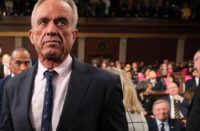In a recent development overnight on Saturday, the Senate approved a funding bill to prevent an extensive government shutdown, which was then forwarded to President Biden for his approval. This step came after the House had also approved the measure on Friday night, just before the midnight deadline.
As the deadline for a possible government shutdown was fast approaching, there were concerns about which services and payments might be affected if the funding was not approved, especially with the holiday season around the corner. The potential shutdown was due to controversy surrounding a spending bill designed to extend funding until mid-March, which fell through after objections from several Republicans, including President-elect Donald Trump and business magnate Elon Musk. They were particularly concerned about the billions of dollars added to the bill. Despite a revised version failing on Thursday, another attempt was successful in the House on Friday.
Without new spending approved by Congress, federal agencies would generally be unable to distribute funds, with few exceptions. Consequently, agencies would need to decide which employees would remain on duty, which could have varying impacts on government operations.
David Wessel, a senior fellow in economic studies at the Brookings Institution, noted that such shutdowns can disrupt various processes, including applications for passports, small business loans, and government benefits. He also pointed out that each week of a federal shutdown could cost the U.S. economy $6 billion due to delays in government spending and reduced pay for furloughed workers.
In the event of a government shutdown, each federal agency would come up with its own contingency plan, and nonessential operations would be halted. Many government employees would be furloughed, although those offering essential services such as law enforcement and air traffic control will continue to work. However, these federal workers would only receive their pay once Congress approves a new spending bill.
Economist Gregory Daco warned that a government shutdown could have a significant impact on the economy, causing financial markets and private sector confidence to waver. Additionally, delays in government spending and reduced pay for furloughed workers could cost the U.S. economy $6 billion for each week of a federal shutdown.
Despite the risk of a shutdown, Social Security recipients would still receive their checks, and Medicare would also continue to operate. However, some services offered by the Social Security Administration might be affected. Similarly, air travel and mail delivery would continue as usual, while active-duty military and federal law enforcement would work but without pay.
The threat of a government shutdown has increased, according to Goldman Sachs analysts. However, they also indicated that a long-term shutdown is unlikely.
The Associated Press contributed to this report.





